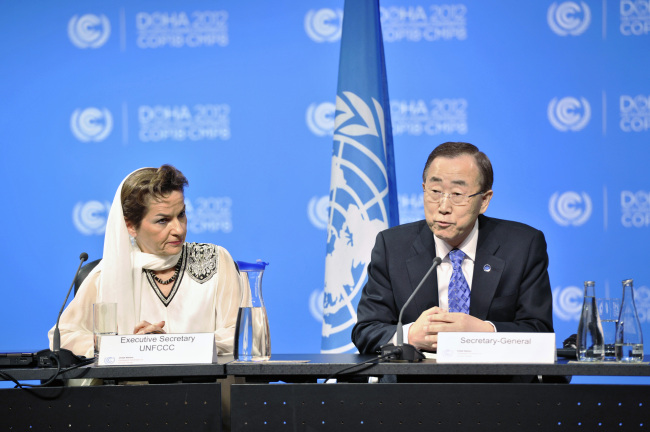DOHA (AFP) ― A U.N. climate conference on Saturday extended the life of the Kyoto Protocol, the only binding pact on curbing greenhouse gas emissions, in a small but symbolic victory in the fight against global warming.
It took much haggling and many hours of lost sleep in the Qatari capital to arrive at the deal on interim measures to halt climate change pending a new, global pact due to take effect in 2020.
An extension of Kyoto was finally approved with the 27-member European Union, Australia, Switzerland and eight other industrialized nations signing up for binding emission cuts by 2020.
They represent about 15 percent of global emissions.
 |
United Nations Secretary-General Ban Ki-moon (right) and Christiana Figueres, Executive Secretary of the United Nations Framework Convention on Climate Change, attend a joint press briefing at the Qatar National Convention Center in Doha on Friday. (Xinhua-Yonhap News) |
U.N. leader Ban Ki-moon welcomed the deal, dubbed the Doha Climate Gateway, as an important first step but said through his spokesman that “far more needs to be done.”
The protocol locks in only developed nations, excluding major developing polluters such as China and India, as well as the United States which refuses to ratify it.
In practice, experts say the lengthening of the protocol will make little difference to pollution levels as it covers such a small portion of emissions and its signatories all had their own legislated targets anyway.
“It is a modest but essential step forward,” European climate commissioner Connie Hedegaard said at the conclusion of talks that had continued throughout Friday night and ran a whole day into extra time, paralyzed as rich and poor nations faced off over financing and compensation for climate damage.
After 12 days of haggling that ran aground almost from the start, conference chairman Abdullah bin Hamad al-Attiyah finally rushed through the package on Saturday evening.
He had earlier urged delegates to seek consensus and not “open the box of Pandora again because we will never finish” ― a warning that was all but ignored. Attiyah was left waiting in the plenary hall for more than four hours as bartering continued.
The vice prime minister rode roughshod over countries’ objections as he swung the gavel in quick succession and proclaimed: “It is so decided” to loud applause.
Russia noted an objection to the passing of the deal on Kyoto, whose first leg expires on Dec. 31.
The latest round of U.N. climate talks, notorious for dragging on as negotiators hold out to the very last in a poker-like game of oneupmanship, deadlocked on financing and “hot air” carbon credits.
“Hot air” refers to tradable greenhouse gas emission quotas that countries were allotted under the first leg of the 1997 Kyoto Protocol and did not use ― some 13 billion tons altogether.
Poland and Russia hold many such credits, having emitted much less than their lenient quotas, and insisted on being allowed to bank the difference beyond 2012 ― a move most other parties vehemently opposed.
The package deal does allow the credits to be banked, but most potential markets, including the EU, Australia and Japan, stipulated in the document that they would not be buying.
The deal includes wording on scaling up funding to help poor countries deal with global warming and convert to planet-friendlier energy sources ― but does not list any figures.
Developed nations were under pressure in Doha to show how they intend to keep a promise to raise climate funding for poorer nations to $100 billion per year by 2020 ― up from a total of $30 billion in 2010-2012.
Developing countries say they need at least another $60 billion between now and 2015 ― starting with $20 billion from next year ― to deal with a climate change-induced rise in droughts, floods, rising sea levels and storms.
The United States and European Union refused to put concrete figures on the table for 2013-2020, citing tough financial times.
Another point of dispute was a demand by least developed countries and those most at risk of sea level rise that provision be made for the losses they suffer because of climate change they blame on the West’s polluting ways.
NGOs and delegates have expressed frustration at the slow pace of negotiations that coincided with a slew of fresh scientific warnings of a calamitous future of more frequent extreme weather.
“Those who are obstructive and self-serving need to realize we are not talking about impacts on how comfortable your people live, but whether or not our people will live,” said Kieren Keke, negotiator for the Alliance of Small Island States.
“There is a fork in that path. We need to take the correct turn as we walk this path, or this process will collapse and our nations will disappear.”





![[Exclusive] Hyundai Mobis eyes closer ties with BYD](http://res.heraldm.com/phpwas/restmb_idxmake.php?idx=644&simg=/content/image/2024/11/25/20241125050044_0.jpg)

![[Herald Review] 'Gangnam B-Side' combines social realism with masterful suspense, performance](http://res.heraldm.com/phpwas/restmb_idxmake.php?idx=644&simg=/content/image/2024/11/25/20241125050072_0.jpg)
